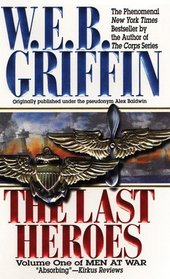Like another series I've read by this author, this book keeps you turning the pages. And it is based on numerous historical facts, especially the uranium ore mines.
But I sometimes wondered, while reading the book, if the "heroes" had spent more time fighting the war and less time trying to get laid, World War II might have ended sooner. But then I remembered the Viet Nam era, when those opposed to that war often shouted, "Make love, not war." Some older comedian worked that into his routine and ended by stating, "In World War II we did both!"
My only problem with the book is the parts stating General MacArthur and men on Bataan suffered defeat because they were promised support from the U.S president who "lied to them."
Well, there is a lot of truth in that, but the U.S. really couldn't have done so at that time. But when MacArthur and his staff left Manila and retreated to Bataan, they left behind warehouses full of food and medical supplies that the Japanese then used. At one point during the fighting on Bataan, the Japanese had suffered so many casualties, they had to stop attacking and await reinforcements. If those warehouses of food and medical supplies had been properly moved to Bataan, and there was time to do so, the U.S. and Filipino forces could have held out much longer and maybe even have counterattacked when the Japanese stopped.
Plus, the several times in this book when MacArthur was told he must leave the Philippines and go to Australia, he threatened to resign as commanding officer and enlist as a private to fight on Bataan. This really happened, but those familiar with MacArthur knew it was just another scene in MacArthur's Theater of the Absurd.
Yes, I know this is a novel, but those are the historical facts.
But I sometimes wondered, while reading the book, if the "heroes" had spent more time fighting the war and less time trying to get laid, World War II might have ended sooner. But then I remembered the Viet Nam era, when those opposed to that war often shouted, "Make love, not war." Some older comedian worked that into his routine and ended by stating, "In World War II we did both!"
My only problem with the book is the parts stating General MacArthur and men on Bataan suffered defeat because they were promised support from the U.S president who "lied to them."
Well, there is a lot of truth in that, but the U.S. really couldn't have done so at that time. But when MacArthur and his staff left Manila and retreated to Bataan, they left behind warehouses full of food and medical supplies that the Japanese then used. At one point during the fighting on Bataan, the Japanese had suffered so many casualties, they had to stop attacking and await reinforcements. If those warehouses of food and medical supplies had been properly moved to Bataan, and there was time to do so, the U.S. and Filipino forces could have held out much longer and maybe even have counterattacked when the Japanese stopped.
Plus, the several times in this book when MacArthur was told he must leave the Philippines and go to Australia, he threatened to resign as commanding officer and enlist as a private to fight on Bataan. This really happened, but those familiar with MacArthur knew it was just another scene in MacArthur's Theater of the Absurd.
Yes, I know this is a novel, but those are the historical facts.
Volume On of Men At War by W.E.B. Griffin, great read, takes you into the Office of Strategic Service (OSS) during WW II. Great Story
June 19141. The ominous clouds of war are beginning to break over Europe. Determined that the US will be prepated, FDR and "Wild Bill" Donovan orchestrate the most complex espionage organization is history, the Office of Strategic Services.





